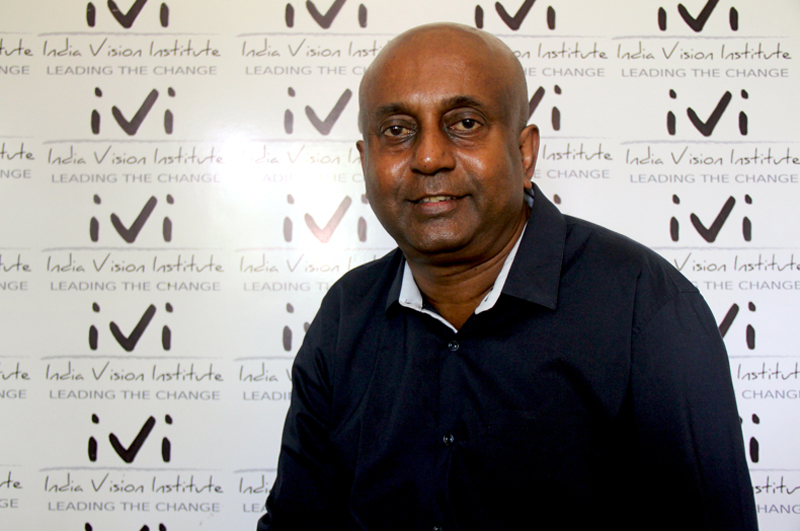 Indian Spectacles
Indian Spectacles
Spectacles for every Indian in need of a pair
India has 270 million people live with vision impairment, and 9.2 million have blindness. No fewer than half of those people could have avoided vision impairment if they had timely access to a pair of basic spectacles.
An estimated 6% of children need a pair of spectacles. With the increase in Myopia among school age children, this number is growing. Access to these simple yet potentially transformative devices can improve the quality of children’s education and mental health. Societies with greater access to spectacles can achieve higher literacy rates and a corresponding drop in crime. India’s children deserve a chance to realise their potential, and we cannot afford to let poor vision hinder their growth.
As a developing country, India’s productivity levels will be boosted no end by a workforce that can see well. About 55% of adults need spectacles. Productivity at work increases by thirty percent when workers needing a pair of glasses are given access to them. This, in turn, produces a positive spin-off effect on economic growth and development in general and can enable a virtuous cycle leading to a reduction in poverty levels.
Thousands of people lose their lives in preventable road accidents every year. Poor vision and low levels of spectacle usage are responsible for many of these accidents. Imagine how much safer our roads would be if only every driver in need had access to a pair of eyeglasses. It is unfortunate that 90 percent of the commercial drivers we have provided spectacles after vision screening are first time wearers with 2% of them having very blurry vision without glasses which would have made driving difficult for them.
India has made a lot of progress in improving the eye health of our people over the last few decades. Today, we have over 40,000 optometrists and over 200 optometry colleges. Organisations such as India Vision Institute (IVI) have worked tirelessly and made an impact to transform over 700,000 lives through vision screenings and a pair of spectacles for thousands in need. Governments, too, have started to take steps in the right direction and the National Commission for Allied & Healthcare Professions Act, 2021 is a significant milestone.
Our successes so far notwithstanding, a lot remains to be done. As high as 40% of people fail to get a pair of spectacles, either because they cannot afford them or because of a lack of access in remote parts of the country. While there is good penetration of eye care facilities and stores in India's Tier I cities, its coverage in smaller towns and villages is patchy at best and, in some cases, non-existent.
The operationalisation and implementation of the National Commission for Allied & Healthcare Professions Act will define the future. It needs greater collaboration and cooperation between the government, industry, academia, eye care practitioners, and the not-for-profit sector. We need better mechanisms to facilitate access for the unreached. Leveraging modern technology and synergising strategies with key government initiatives can help accelerate the process. For example, the spectacles manufacturing industry can take advantage of the government’s ‘Make in India’ policy to transform India into a hub for large-scale manufacturing of lenses and spectacle frames. If this is done correctly, economies of scale will ensure that the average Indian will find owning a pair of spectacles much more affordable.
Not-for-profit organisations and social entrepreneurs must improve the implementation strategies for our outreach programs. Awareness will play a crucial role. Many Indians are unaware of the problems associated with uncorrected refractive error and the benefits of owning a pair of spectacles. It is our responsibility to spread awareness. In this regard, the ‘See Now’ campaign that IVI played an important part is, can be a good example. The campaign saw outreach to the local media, especially the vernacular language press, to generate awareness about eye health at the grassroots level through the voice of a celebrity in this case popular film actor Amitabh Bachan. It sought to dispel the myths and taboos associated with eye health and spectacles and partnered with several organisations, and effectively made use of a celebrity ambassador to drive home the message.
Funding is a perennial challenge for social entrepreneurs and non-governmental organisations. For India to achieve our sustainable development goals and ensure access to spectacles for every Indian in need of a pair, our not-for-profits will need better funding and collaboration with governments, industry and other stakeholders. We must also speak in one voice to the government to ensure that our challenges are appreciated and our concerns addressed. Most importantly, a mission-focused approach to ensure that every Indian can access a pair of spectacles should be our driving force. The future of India will depend, in considerable measure, on the health and wellness of our population, and we will continue to do our part in securing that future.
(The article is based on a lecture delivered to the National Optometry Conference in Delhi recently)
Support Our Journalism
We cannot do without you.. your contribution supports unbiased journalism
IBNS is not driven by any ism- not wokeism, not racism, not skewed secularism, not hyper right-wing or left liberal ideals, nor by any hardline religious beliefs or hyper nationalism. We want to serve you good old objective news, as they are. We do not judge or preach. We let people decide for themselves. We only try to present factual and well-sourced news.







